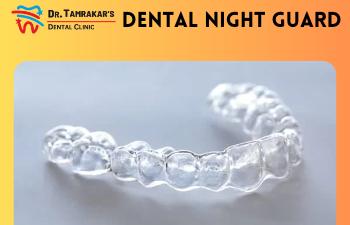A dental night guard, also known as a dental splint or occlusal guard, is a removable oral appliance designed to protect your teeth and jaws during sleep. It is primarily used to treat conditions such as bruxism (teeth grinding) and temporomandibular joint disorder (TMJ disorder). Bruxism is a common condition in which a person clenches or grinds their teeth during sleep. This can lead to various dental problems, including tooth wear, tooth fractures, jaw pain, headaches, and muscle tension. A dental night guard provides a barrier between the upper and lower teeth, cushioning the impact of grinding and preventing tooth damage. A dental night guard is typically made of a durable, flexible material that is custom-fitted to your mouth. The process of getting a night guard involves visiting a dentist or a dental professional who will take impressions of your teeth. These impressions are used to create a customized guard that fits comfortably and securely over your teeth. When wearing a dental night guard, it creates a separation between your upper and lower teeth, preventing them from coming into direct contact. This helps to reduce the grinding forces and provides a cushioning effect, protecting your teeth and relieving pressure on the jaw joint. Using a dental night guard can have several benefits: Protects teeth: The guard acts as a barrier, preventing tooth wear, chipping, and fractures caused by grinding. Relieves jaw pain: By reducing the impact of grinding forces, a night guard can help alleviate jaw pain and discomfort associated with TMJ disorder. Prevents headaches: Many people experience tension headaches caused by teeth grinding. A night guard can help reduce the frequency and intensity of these headaches. Improves sleep quality: Bruxism can disrupt sleep patterns. By wearing a night guard, you may experience improved sleep quality as the grinding is minimized. It's important to note that a dental night guard is a customized appliance prescribed by a dentist. Over-the-counter or generic night guards are available, but they may not fit properly or provide adequate protection. Consulting with a dentist will ensure that you receive a night guard tailored to your specific needs. Additionally, maintaining good oral hygiene by brushing your teeth regularly, flossing, and attending dental check-ups is still essential even when using a dental night guard.


